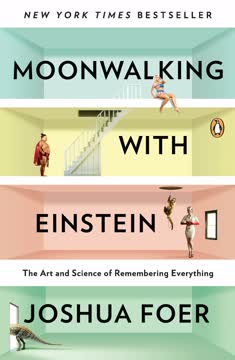Key Takeaways
1. Ultralearning: An intense, self-directed approach to rapid skill acquisition
Ultralearning: A strategy for acquiring skills and knowledge that is both self-directed and intense.
Self-directed learning. Ultralearning is a powerful approach to rapidly acquire new skills and knowledge. It's characterized by:
- Intense focus and dedication
- Self-directed study methods
- Ambitious learning goals
Unlike traditional education, ultralearning empowers individuals to take control of their learning journey. This approach has been used by numerous successful individuals across various fields to achieve remarkable results in short periods.
Real-world examples. The book presents several inspiring case studies:
- Benny Lewis: Learned to speak new languages fluently in three months
- Eric Barone: Taught himself game development and created the hit game Stardew Valley
- Roger Craig: Used data analysis to dominate on Jeopardy!
These examples demonstrate the potential of ultralearning to transform one's skills and career trajectory.
2. Metalearning: Create a strategic map for your learning journey
Metalearning means learning about learning.
Research and planning. Before diving into a new subject, invest time in understanding how to learn it effectively:
- Research the subject's structure and common learning approaches
- Identify key resources and learning materials
- Break down the skill into concepts, facts, and procedures
The Expert Interview Method. One powerful metalearning technique is to interview experts in the field you're studying. This can provide valuable insights into:
- The most effective learning strategies
- Common pitfalls to avoid
- Essential resources and techniques
Aim to spend about 10% of your total expected learning time on this initial research phase. This investment will pay off by making your subsequent learning more efficient and effective.
3. Focus: Sharpen your concentration for optimal learning
Focus doesn't need to be exclusive to the domain of those who have endless hours and large swaths of free time on their schedule.
Combat distractions. Develop strategies to maintain focus:
- Create a distraction-free environment
- Use techniques like the Pomodoro method (25 minutes of focus followed by a 5-minute break)
- Practice mindfulness to improve concentration
Optimize arousal levels. Different tasks require different levels of mental arousal:
- High arousal: Good for simple, well-practiced tasks
- Moderate arousal: Ideal for complex problem-solving
- Low arousal: Beneficial for creative tasks and generating new ideas
Experiment with your environment and mental state to find the optimal conditions for different types of learning tasks.
4. Directness: Learn by doing, not just studying
Directness is the idea of learning being tied closely to the situation or context you want to use it in.
Apply knowledge immediately. To maximize transfer of learning:
- Engage in project-based learning
- Seek out immersive learning experiences
- Use simulations when direct practice isn't possible
The Transfer Problem. Research shows that knowledge often doesn't transfer well from classroom settings to real-world applications. Combat this by:
- Identifying how you'll use the skill in real life
- Structuring your learning to closely mimic those situations
- Regularly practicing in contexts similar to where you'll apply the skill
5. Drill: Isolate and intensively practice weak points
Drill: Attack Your Weakest Point.
Identify bottlenecks. Analyze your performance to find the specific sub-skills or knowledge areas holding you back. Common methods include:
- Time slicing: Break down a skill into smaller time segments
- Cognitive components: Isolate specific mental processes
- The Copycat: Replicate expert performance in one area while simplifying others
Design targeted exercises. Create drills that focus exclusively on your weak points:
- Increase repetitions of difficult elements
- Vary the context and difficulty of practice
- Use deliberate practice techniques to push beyond your comfort zone
Remember to periodically integrate drilled skills back into full practice to ensure transfer.
6. Retrieval: Test yourself to enhance learning and retention
Testing isn't simply a way of assessing knowledge but a way of creating it.
Active recall. Instead of passive review, regularly test yourself on the material you're learning:
- Use flashcards or spaced repetition systems
- Practice free recall by writing down everything you remember about a topic
- Solve problems without looking at reference materials
Desirable difficulties. Introducing challenges during retrieval practice can enhance learning:
- Delay initial testing to increase difficulty (but not so long that you forget completely)
- Use open-ended questions rather than multiple-choice
- Practice retrieving information in varied contexts
By making retrieval more effortful, you strengthen the neural pathways associated with the information, leading to better long-term retention.
7. Feedback: Seek and use constructive criticism effectively
Feedback is harsh and uncomfortable. Know how to use it without letting your ego get in the way.
Types of feedback:
- Outcome feedback: Indicates overall performance
- Informational feedback: Highlights specific areas for improvement
- Corrective feedback: Provides guidance on how to improve
Strategies for effective feedback:
- Seek immediate feedback when possible
- Focus on the signal, not the noise (look for consistent patterns)
- Create high-intensity, rapid feedback loops
- Use metafeedback to evaluate your learning strategy
Remember that feedback can sometimes be demotivating if not processed correctly. Learn to separate ego from performance and use criticism as a tool for growth.
8. Retention: Implement strategies to combat forgetting
Don't Fill a Leaky Bucket.
Understand forgetting. Three main theories explain why we forget:
- Decay: Memories fade over time
- Interference: New information overwrites old memories
- Forgotten cues: We lose access to retrieval pathways
Retention strategies:
- Spacing: Spread out study sessions over time
- Proceduralization: Turn declarative knowledge into automatic skills
- Overlearning: Practice beyond initial mastery
- Mnemonics: Use memory techniques for hard-to-remember information
Implement a combination of these strategies to ensure long-term retention of your newly acquired skills and knowledge.
9. Intuition: Develop deep understanding through varied approaches
Do not ask whether a statement is true until you know what it means.
Build mental models. Develop a rich understanding of the subject by:
- Creating concrete examples for abstract concepts
- Explaining ideas in your own words (the Feynman Technique)
- Connecting new information to existing knowledge
Challenge your understanding. Regularly test the depth of your intuition:
- Solve novel problems that require applying concepts in new ways
- Teach the material to others
- Seek out edge cases and exceptions to rules
By developing strong intuition, you'll be better equipped to apply your knowledge flexibly and creatively in real-world situations.
10. Experimentation: Push boundaries to discover what works best for you
Results? Why, I have gotten lots of results! I know several thousand things that won't work.
Embrace a growth mindset. View your learning abilities as flexible and improvable:
- Try different learning methods and resources
- Explore various techniques within your chosen field
- Push yourself outside your comfort zone
Strategies for experimentation:
- Copy, then create: Start by emulating experts, then develop your own style
- Compare methods side-by-side: Test different approaches simultaneously
- Introduce new constraints: Force yourself to solve problems in novel ways
- Find your superpower: Combine unrelated skills for unique advantages
- Explore the extremes: Push ideas to their limits to gain new insights
Remember that failure is a natural part of the experimentation process. Each "unsuccessful" attempt provides valuable data for refining your approach.
Last updated:
FAQ
What's Ultralearning about?
- Self-Directed Learning Strategy: Ultralearning by Scott H. Young is a guide to mastering skills through self-directed and intense learning strategies. It encourages taking control of your learning process to achieve mastery.
- Nine Principles: The book introduces nine principles, including Metalearning, Focus, Directness, Drill, Retrieval, Feedback, Retention, Intuition, and Experimentation, to optimize learning.
- Real-World Applications: Young shares personal stories and examples of others who have successfully used ultralearning techniques to quickly and effectively learn complex skills.
Why should I read Ultralearning?
- Practical Techniques: The book offers actionable strategies for any learning endeavor, making it valuable for students, professionals, and lifelong learners.
- Inspiration from Stories: It includes inspiring stories of individuals who have undertaken ambitious learning projects, motivating readers to pursue their own ultralearning goals.
- Challenge Traditional Education: Ultralearning provides alternatives to conventional education, empowering readers to learn in ways that suit their personal styles.
What are the key takeaways of Ultralearning?
- Self-Directed Learning: Emphasizes taking initiative in your education, allowing for flexibility and personalization in learning.
- Direct Practice: Advocates for learning by doing, ensuring that what you learn is applicable in real-world situations.
- Feedback and Retrieval: Highlights the importance of seeking feedback and practicing retrieval to reinforce knowledge and improve retention.
What is the Metalearning principle in Ultralearning?
- Understanding Learning Processes: Metalearning involves learning about how to learn effectively, encouraging learners to map out the subject they wish to master.
- Research and Preparation: Conducting research before starting a new subject can save time and enhance the learning experience.
- Long-Term Benefits: Developing metalearning skills aids in current projects and builds a foundation for future learning endeavors.
How does Ultralearning define Directness?
- Learning by Doing: Directness emphasizes engaging in activities that closely resemble the skills you want to develop.
- Avoiding Indirect Learning: Warns against passive learning methods, advocating for hands-on experiences that challenge you to apply what you’ve learned.
- Examples of Direct Learning: Provides examples of successful direct learning methods, such as language immersion and creative projects.
What is the Drill principle in Ultralearning?
- Targeting Weaknesses: Focuses on identifying and practicing the weakest points in your skill set to improve overall performance.
- Rate-Determining Steps: Certain aspects of a skill may act as bottlenecks; drilling these components can enhance proficiency.
- Structured Practice: Drills can take various forms, allowing you to focus on specific skills without distractions.
How does Ultralearning suggest using Retrieval?
- Testing as a Tool: Emphasizes the importance of actively recalling information rather than passively reviewing it.
- Desirable Difficulty: Engaging in challenging retrieval tasks leads to better learning outcomes.
- Practical Applications: Provides methods for practicing retrieval, such as flashcards and self-generated challenges.
What role does Feedback play in Ultralearning?
- Essential for Improvement: Feedback helps identify strengths and weaknesses, guiding your learning process.
- Types of Feedback: Discusses outcome, informational, and corrective feedback, each serving a different purpose.
- Embracing Discomfort: Encourages seeking aggressive feedback to accelerate learning and overcome challenges.
What is the Feynman Technique mentioned in Ultralearning?
- Teaching to Learn: Involves explaining a concept as if teaching it to someone else to identify gaps in understanding.
- Steps to Follow: Write down the concept, explain it simply, and identify areas of struggle.
- Feedback Loop: Refer back to resources to fill gaps, enhancing retention and understanding.
How can I improve my retention according to Ultralearning?
- Spaced Repetition: Emphasizes spacing out study sessions to enhance long-term retention.
- Active Recall: Engaging in self-testing to solidify memory and strengthen neural connections.
- Overlearning: Practicing beyond initial mastery to ensure skills remain accessible over time.
What role does experimentation play in Ultralearning?
- Encourages Exploration: Experimentation involves trying different methods to find what works best for you.
- Testing Hypotheses: Allows you to test learning techniques and evaluate their effectiveness.
- Fostering Creativity: Pushing boundaries and exploring new techniques develops a creative and adaptable skill set.
How can I apply the principles of Ultralearning to my own projects?
- Set Clear Goals: Define specific, measurable objectives to guide your learning efforts.
- Research and Plan: Understand the best resources and methods for your chosen skill to streamline learning.
- Iterate and Reflect: Regularly assess methods and outcomes, adjusting your approach based on feedback.
Review Summary
Ultralearning receives mixed reviews, with an average rating of 3.95/5. Positive reviewers praise its structured approach to self-directed learning and practical principles. Critics find it repetitive, overly long, and lacking novelty. Many appreciate the author's personal experiences and case studies, but some feel the examples are limited. Readers value the book's insights on meta-learning, focus, and directness in skill acquisition. While some find it inspiring, others argue it could have been more concise and question its applicability for average learners.
Similar Books










Download PDF
Download EPUB
.epub digital book format is ideal for reading ebooks on phones, tablets, and e-readers.





